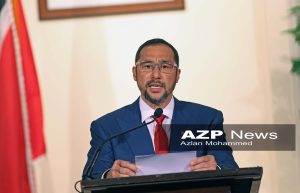By Sue-Ann Wayow
THERE is no need for Trinidad and Tobago to go to the International Monetary Fund (IMF).
This according to Finance Minister Colm Imbert on Wednesday in Parliament in disclosing figures during his Mid-Year Budget Review. He said any suggestion to not borrow money was “ludicrous.”
The minister listed figures as Government attempted to supplement finances to various ministries to offset necessary expenditure.
He said despite the Covid-19 pandemic continuing to impact significantly on T&T’s revenues as Government did not receive the projected amounts anticipated in April, there was still more than sufficient foreign exchange and therefore no need to borrow from the IMF.
Imbert said, “Countries only approach the IMF when they run out of foreign exchange and they can’t service their foreign debt… Since our reserves are still in the vicinity of US$7billion more or less and our Heritage and Stabalisation Fund is still in the vicinity of US$5.7billion, we have more than sufficient foreign exchange at this point in time and therefore there is have absolutely no reason to go to the IMF at this point in time for financial assistance. None whatsoever.”
He added that IMF have been asked for technical assistance on a fairly regular basis.
“We are certainly not going to make structural adjustments such as retrenchments, removal of subsidies and devaluation at this time,” Imbert said.
Revenues did not go as forecasted
The minister said natural gas and oil prices were below forecast, oil production was lower and a supplementation was asked against this backdrop of the economy for the period October 1, 2020 to May/June 2021.
He said updated information received from the Ministry of Energy on Wednesday stated that the weighted average price for this financial year from October 2020 to April 2021 of local crude was US$52.76 per barrel which was above the budget figure of $45.
With respect to oil production for the same period, Imbert said the average oil production was around 58,000 barrels per day. Gas production as at May fluctuated and currently the country was below the standard projection. The net back gas price also fluctuated, he said.
Imbert said, “Since we in T&T get the bulk of our revenue from petroleum, natural gas of the order of two-thirds of our revenue and sometimes more, and just one-third or less comes from oil, the lower production of natural gas and the lower prices of natural gas have affected us significantly.”
In the first eight months of fiscal 2021, there has been a significant reduction in revenue primarily from the natural gas sector, he said.
There was a shortfall of $400million from taxes from incomes and profits from oil companies from a projected $1.3billion by the end of April and from other companies there was a shortfall of $100million. Additionally, $3.48billion was received from individual taxation just under from the projected $3.5billion in April.

Imbert said, “The taxation from individuals is almost where it supposed to be in terms of our original projections.”
He added, “When you add up the effect and this is primarily with oil companies, it is profoundly affected by Covid-19.”
There was also a significant shortfall in terms of royalties and the anticipated figure by the end of April 2021 of $2.9billion in oil and gas royalties with the actual receipts being $1.1billion, a shortfall of $800million
Although there were negotiations with major oil companies doing business in T&T, because the price and production of gas were being suppressed, extraordinary revenue from oil and gas companies was short of approximately $230million, Imbert said.
In terms of income from royalties and extraordinary revenue the country was short of about $1billion.
Imbert said, “ The fiscal outturn up to April, there has been a shortfall of approximately $2.5billion.”

Supplementation
Imbert said with the allocating the supplemented sums, “Some supplementations are inescapable.”
He said, “We need to do these supplementations to ensure that salaries and wages are paid on time, that central goods and services are provided particularly within the health sector which is our number one priority.”
He added that a considerable supplementation was being requested from the Ministry of Public Utilities to support the Water and Sewerage Authority (WASA).
“It has cost taxpayers in excess of $2billion annually and it is hoped that soon Government will reduce WASA’s dependency on the treasury,” Imbert said.
Emphasis on the health sector
There was a supplementation for the Ministry of Health of $267,113,637 but that was not the full amount because the Ministry of Finance also assist with the sourcing of pharmaceuticals utilising loans taken by The National Insurance Property Development Company Limited (NIPDEC) with a Government guarantee which was a Government liability Imbert stated.
He said within the figure of $267million, there were arrears owed to the ambulance provider, where there were additional trips and must be audited. The Ministry of Health was in audit status to ensure the Government was not being charged for trips not made. There was also supplemented funding for the Regional Health Authorities of $86million to be distributed across the RHAs with the bulk of $34million going to the to North Central Regional Health Authority (NCRHA) that consists of the Couva Hospital and Multi-Training Facility and the Eric Williams Medical Sciences Complex.
Imbert also said the Ministry of Finance has already spent US$10.3million on the procurement of vaccines with a $5.4million balance based on current arrangements. “We expect that we would spend US$15.7million on the vaccines,” he added.
The minister also said the Ministry of Agriculture would get a supplement of $57million as it assist farmers and the market boxes which are being given out to persons in the constituencies.
And he said the police service would receive a supplemental value of $57million and at the end of the fiscal year, the TTPS would receive some police service some $600million for good and services.
![]()












